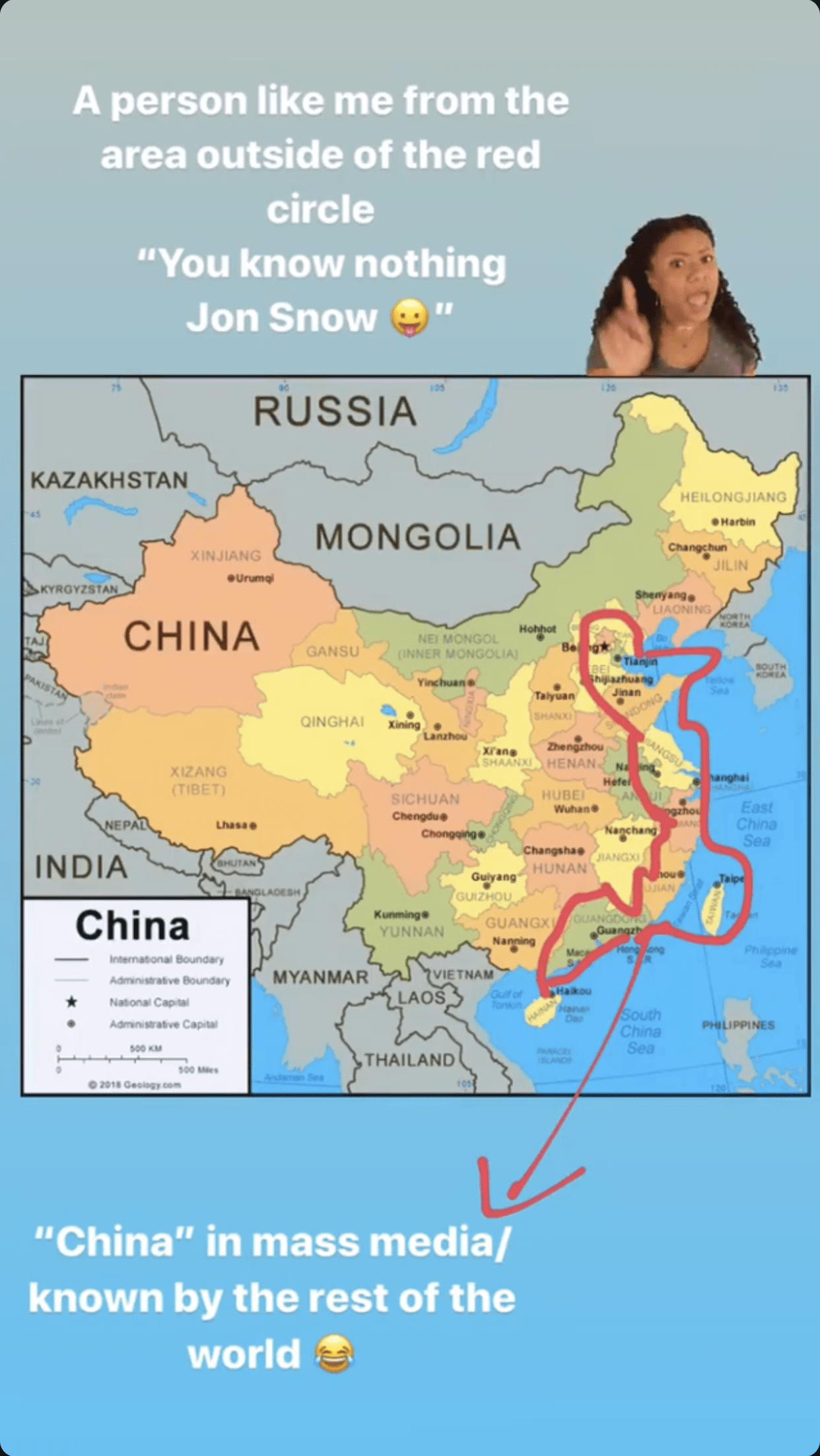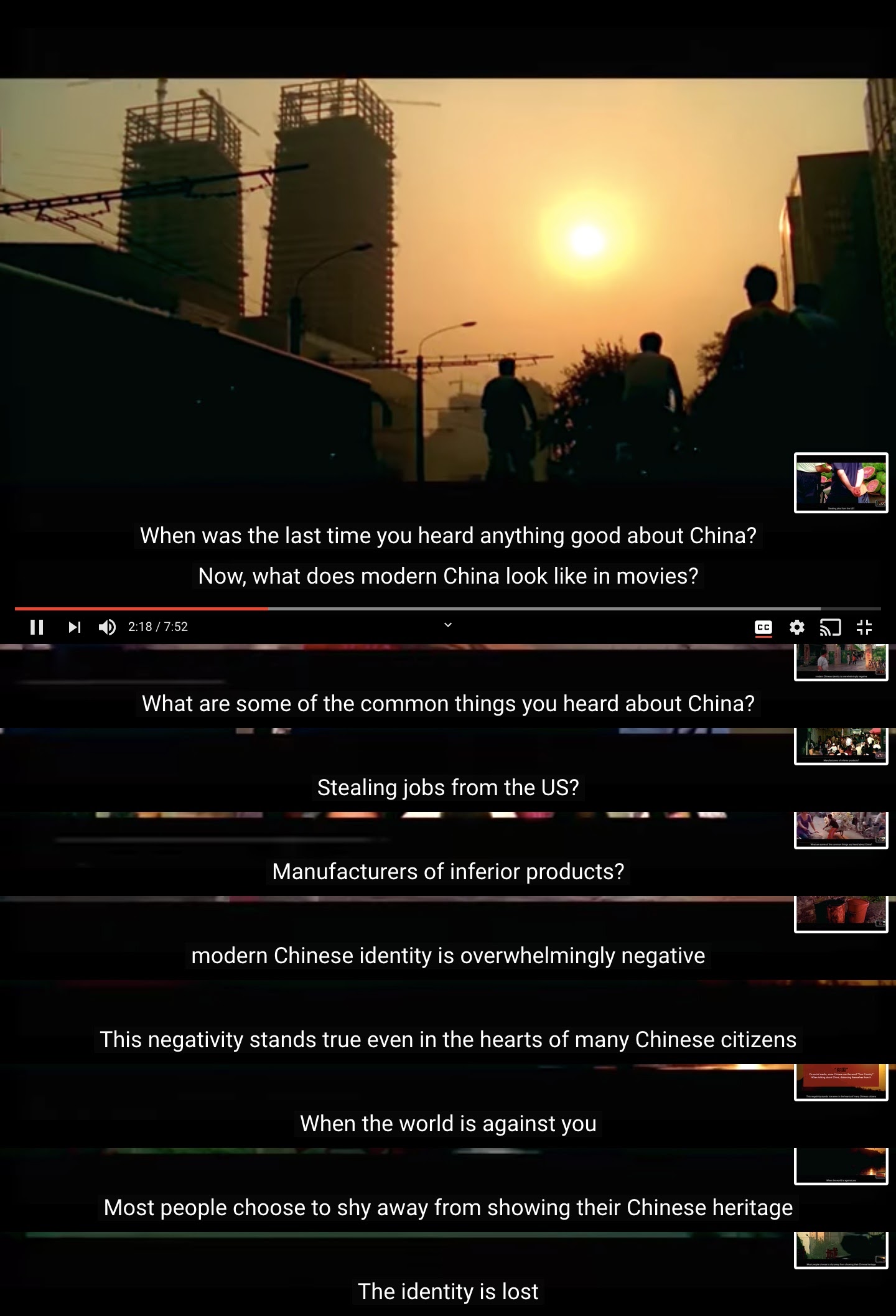—By a Mainlander during the COVID-19 Pandemic
Audio Version:
种族歧视与政见和宗源国毫无关系,你的脸就是原罪

Disclaimer: This is a very subjective thought piece that is fully based on my personal experience and background. I come from Chengdu, a city known for its tolerance of diversity and difference in China, where Catholics and high-profile gays, Muslims and Christians live harmoniously together. The city also has large numbers of ethnic minorities such as Tibetans (藏), Hui (回), Uyghurs (维), Yi (彝), Miao (苗), Qiang (羌), etc. Women enjoy high social standing, and men are made fun of as “fearing their wives”(火巴耳朵)by the rest of China, because Sichuanese men are not as patriarchal, and Sichuanese (incl. Chongqing) women, are fiery-tempered. I also grew up in a very happy and wholesome household where my family members not only love me as their child but also respect me as an individual, which is largely atypical among Chinese parents. Therefore, my privileged background, unusual living environment, and regional pride may have influenced my views on China and on some political issues. So please read this piece with a grain of salt, bearing in mind that I cannot represent Mainland Chinese. However, it is also my individual irregularity that makes the prejudice and stereotypes seeing Mainland China as a monolith false.
One evening during my dreadful quarantine time in England, I randomly opened a Youtube recommendation and started to tidy up my room while listening to the content. The video is entitled “Why are Modern Chinese Movies so Bad,” made by a first-generation Hong Kong immigrant in Canada studying Film Studies. I subscribed to his channel because most of his video essays are not only well-researched pieces on the problematic representation of Chinese on the big screen in the West but also very aesthetically appealing and academically informative in terms of cinematography. However, this time, I was annoyed beyond myself. What did he say?

I paused the video and wrote my first Youtube comments:
“You are talking about Chinese Americans not Chinese for fxxk sake. The clip you keep using here is about Singapore, not Mainland China. Crazy Rich Asians is entirely about Singapore, not China. We are very proud of our Chinese identity. Thank you very much. Only Chinese immigrants in the West are ashamed of their identity. So please stop spreading misinformation. I really like your channel but here you are really biased.”
Looking back, I was certainly biased too, and also over-generalizing when I used “we” to express my personal opinion. However, I was angry at that moment. In fact, I have been really angry for a while since the beginning of this year. This is perhaps the most difficult year for not only Chinese people, but also for anyone with East Asian heritage around the world. The COVID-19 pandemic has gravely affected the already declining economy in the West. While the origins of the virus are now in dispute, it was widely believed that it started in Wuhan, China.[1] Thus Chinese people and anyone who has the “Oriental” face has been targeted by racist hate groups. Ironically as a person who comes from Mainland China, I have never been assaulted or targeted myself during my entire time in the West, mostly due to my huge round eyes (most native Sichuanese girls look like this) and fluent English, which Westerners often compliment me and expect me to say “thank you I’m flattered”. I was incredibly outraged by stories, social media posts, and news that reported a surge of racist attacks at Chinese students (e.g. Chinese students at Sheffield University) and East Asians in general in the UK alone.[2]
Before the pandemic, the ongoing right-wing tribalism and the Neo-Nazi racist campaign had been gaining young (white, working-class, male) followers all over the world, ever since President Trump came into office. His blatantly racist rhetoric has encouraged the long-suppressed xenophobic sentiment among the (financially and sexually) frustrated younger generation. Lockdown makes the living conditions even worse for the underprivileged and is also affecting the newly graduated and small business owners, whose lives depend on human interactions. These people are angry, too, and understandably so. Apart from blaming Boomers as they have been doing for a while, China, a country with a very negative international image for political and ideological reasons, has become the scapegoat for those who have lost money, jobs, opportunities, and even families. Before the pandemic, AI technology reformation had already made many low-skilled jobs redundant, and those unemployed directed their hatred toward foreigners, especially racial minorities who look drastically different from the natives, in this gradual and invisible productivity reformation. Thus, “stealing jobs from the US,” a racist myth that has long been circulating among the xenophobic, as this YouTuber mentioned in his video essay, has been one of the negative impressions people have had about the Chinese. What makes me angry and sad is that this person has internalised the racist narrative while trying to resist it.
Lost Chinese identity?
“When the world is against you, most people choose to shy away from their Chinese identity.”
Why are Modern Chinese Movies so Bad | Video Essay by @Accented Cinema
This statement rings true among the Chinese diaspora community, Hong Kongers, Taiwanese, and some Mainland Chinese people, too. While I truly have compassion for the pain, the disappointment, the frustration they felt while leaving their homeland to look for a better life in the West, I cannot help but look down upon such a “bent-over” mentality.
山川異域,風月同天。寄諸佛子,共結來緣。
When the pandemic had just erupted in Wuhan, and China was in a state of emergency, people were panicked and irrationally stocked resources. Masks were the first material goods that ran out. Japan and Korea, neighbours who have had rocky relationships with China in the past, sent hundreds of boxes of masks to help us. On each box of masks printed a Chinese poem that reflects our ancient bond in the shared Chinese Culture (中华文明; 中華文明) and friendship with Japan and Korea, as the two have been deeply influenced by Chinese civilization and at some point were China’s vassal states. It was heart-warming when I saw Weibo posts collecting all those beautiful and moving poems along with explanations and sources.

For instance, 山川异域,风月同天 (山川異域,風月同天; Shanchuan yiyu, fengyue tongtian;) on the first batch of masks sent by Japanese Institute of Hanyu Shuiping Kaoshi (HSK) to various universities in Hubei.[3] There are many different English translations online for this poem. Among them, “Although hills ’n rills set us apart, the moon and wind share our kind hearts.” (translated by 许景城) and “Lands apart, Sky shared” (anonymous) are most popular. This poem is collected in Quan Tangshi (The Full Collection of Tang Dynasty Poems) and was written by Prince Nagaya (長屋王; 684 –729) a politician of the Nara period and an imperial prince of Japan. The prince wrote this poem and ordered it to be embroidered on the thousands of Kasaya robes he prepared for Tang Buddhist masters as diplomatic gifts. Then, Japanese students and monks brought these gifts to Tang China when they were on government missions to learn Buddhism and Chinese civilization in general. This deep understanding of Chinese culture reminded us of our national pride in the Tang era as well as the friendship we have shared with Japan since ancient times. In times of adversity, that poem made many Chinese netizens well up and feel deeply grateful for Japanese people’s kindness. There are many more poems like that but I won’t go into details here.
Apart from Japan, when the world started to be extremely racist toward Chinese because of the pandemic, many American celebrities also stood up for China and informed people how misleading and biased some of their own media are.

For instance, at the beginning of the pandemic, there was a widely spread rumour that the disease came from bats and that the Chinese ate bat soup so they got infected and spread the virus all around the world. I was even a victim of this rumour because I am aware that people from the coastal area of China do have many unusual specialities.
But then, a famous American celebrity medical doctor Doctor Mike (who has 6.17 million subscribers on YouTube) made a video (see above from 3’18’’) to clarify that the widely spread footage of a Chinese woman eating bat soup was neither shot in 2019 nor in China. After his conspiracy debunking, I did a research and found that footage was a 2016 travelogue made by that Chinese video maker who was in the Republic of Palau, a Pacific Island country. She was eating Palau’s local speciality—fruit bat soup, in which the bat is also a domesticated breed specifically raised for the local food industry (Guancha.Cn.). In the meantime, because Mainland Chinese people couldn’t access social media sites like Twitter or Reddit due to the Great Fire Wall, they didn’t know some overseas Chinese were spreading lies on cyberspace, thus they couldn’t even defend themselves, and explain to people that a lot of the information about China online were false.
Honestly, the Chinese government is really stupid to leave the international public opinion space completely in the hands of anti-China groups by blocking platforms where ordinary Mainlanders could interact with international people online. Sometimes, I think they are not preventing China from terrorist attacks, but are protecting the rest of the world from Mainland Chinese people’s rage once they get to know how much they have been vilified. [4]
Meanwhile, these anti-China Chinese groups were pleased with the chance to bash their fellow people in the Mainland. They taunted them online and spread all kinds of rumours, pictures, and false videos online with malicious delight to smear Mainlanders. Because of their Chinese identity as the “insiders” of the Chinese community, ordinary Westerners who initially did not have negative views of China took their words as truth and started to hate China.
When on the streets of many cities in Japan, slogans were hung up in shops and pharmacies written in Kanji (Chinese characters) “ Hang-in there, China!” “We are with you in this battle!” “Free hand sanitizer inside!” “Masks are provided for Chinese friends,” But on the wall of Warwick University’s student union, Hong Kongers painted a pig and wrote “Shina [支那] pigs.”[5]
Early in February when I was protesting in Trafalgar Square against the racist attacks against the Chinese, I met a second-generation British Hong-Kong reporter/photographer and became friends with this person. We followed each other on social media for a while. We certainly have a lot in common when the common interests are related to Western culture, e.g. we both are well-trained in Western classical musical instruments, a shared interest in Western fine art esp. Renaissance art, and European history, etc. When I share my daily routine posts of Chinese Culture like Han Fu, poems, paintings, history, however, he often comments that he did not even know about these things before. He said he didn’t know anything about Chinese history. He found it interesting. During the entire time, we communicated in English. But later we fell out because he was (unsurprisingly) verbally attacking Mainland Chinese online.
As a Mainlander, I have a sense that they are so addicted to hating Chinese and their Chinese identity, that’s how they lost their identity. They no longer resonate with those beautiful poems of our ancient time as Japanese do, because some of them do not even understand the Chinese language anymore. Many Chinese first-generation immigrants encourage their children to speak English as much as they can. They even have a sense of superiority that they cannot speak Chinese anymore but fluent English. I got to know this when I was travelling in Australia to visit a childhood friend who immigrated to Melbourne when we were in high school.
In China, we jokingly call these people 高华跪族 (gaohua guizu), meaning “upper-tier Chinese bent-overs.” It plays with “跪族” (bent-overs) with the homophonic “贵族” (aristocrats) with a wink, which pokes fun at those Chinese who think they are superior to their fellow people because they live in the West or are completely Westernized, while in reality they are walked over by white people and can never truly succeed in the West because of the bamboo ceiling. Also, as an academic in postcolonial studies, I can’t help but want to knock on Frantz Fanon’s coffin and shout, “Viens ici! you gotta check this out, mon pote! Isn’t it a typical case of colonial mentality and self-hatred generated by a frustrated attempt to fit in?” [6] [7]

I heard many stories and read many articles so I understand how much sadness and hardship the Chinese diaspora have endured while growing up as the racial minority. How many times they have to hide themselves in the toilet to eat their “exotic” lunch ridiculed by their peers at schools; how many times they have been called names, verbally and physically attacked out of no reason on the street while minding their own business; and how many times they have been unfairly treated in their companies and by their colleagues and supervisors; how many times they have been either lying at the bottom of dating market (Asian men) or hypersexualized to satisfy white men’s weirdest fantasies (Asian women), etc.
Human beings are social animals and yearn to be accepted. I truly understand how much the Chinese diaspora wishes to be accepted by the mainstream in the West and to be equally treated. They work extremely hard in their respective fields, adopting Western (white) habits, language, culture, and decidedly to Westernise themselves to keep up with the white. They become the model minority who never causes trouble, always obey rules, always behave themselves as not only the good citizens but also to set examples (in their head) for other minority groups to imitate (yikes!). All because they were told, if you work hard enough and behave well enough, you will become “one of us,” said their “white masters.” Thus they not only live extremely careful to ape white people, but also have internalized white racist ideas about other racial groups (Black, Latinx, South Asians, and Arabs), and are the most racist against their fellow people who have not yet been “model-minoritized.” This is what is called in-group cringe obsession only found in oppressed minority groups—women, LGBTQ+, and racial minorities.
TBC.
[1] See Telegraph article Covid-19 may not have originated in China, Oxford University expert believes Senior CEBM tutor Dr Tom Jefferson believes many viruses lie dormant throughout the globe and emerge when conditions are favourable. Also, BBC Science Focus Magazine article “The coronavirus may not have originated in China, says Oxford professor”
[2] See Resonate’s Instagram account that records almost all the large-scale racist attacks from the beginning of 2020
[3] HSK, The Hanyu Shuiping Kaoshi, translated as the Chinese Proficiency Test used in China, is the standardized test of Standard Chinese language proficiency of China for non-native speakers such as foreign students and overseas Chinese.
[4] A series of terrorist attacks in China that happened in the late 2000s and early 2010s (See United States Department of State, Country Reports on Terrorism 2015 East Asia section) were the major reason why the Great Fire Wall has been strictly implemented in China. Before 2008, Mainland Chinese could access foreign internet tools, e.g. Google search, Facebook, Twitter, Wikipedia, and others. I could still access Instagram when I was in China back in 2016, but soon it was also banned.
[5] Shina pronounced as “Zhina” in Chinese Mandarin, written as 支那, is a racist slur for China, and “Shina pigs” or “Shinas” are equivalents of nig*ers, Pa*is, J*ps, which were used by the Nazi Japanese army during the Japanese occupation of China during the WWII. Chinese people were seen as subhuman when being called Shinas, and ready to be massacred.
[6] A colonial mentality is the internalized attitude of ethnic or cultural inferiority felt by people as a result of colonization, i.e. them being colonized by another group. It corresponds with the belief that the cultural values of the colonizer are inherently superior to one’s own.
[7] Frantz Fanon was a French West Indian psychiatrist and political philosopher from the French colony of Martinique (today a French department). His works have become influential in the fields of post-colonial studies, critical theory and Marxism. Fanon’s Marxist writings on imperialism, racism, and decolonizing struggles have influenced post-colonial discussions about the internalization of colonial prejudice. He first tackled the problem of the “colonial alienation of the person” as a mental health issue through psychiatric analysis. Please refer to his book The Wretched of the Earth (1961; French: Les Damnés de la Terre).
